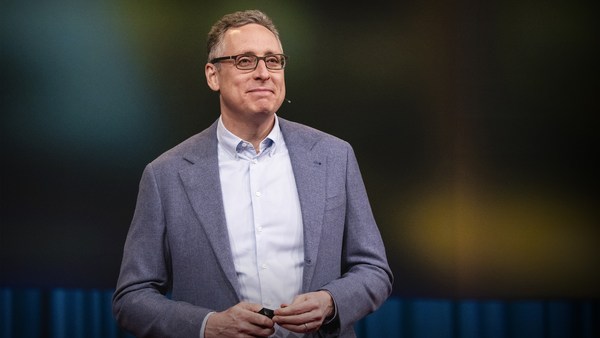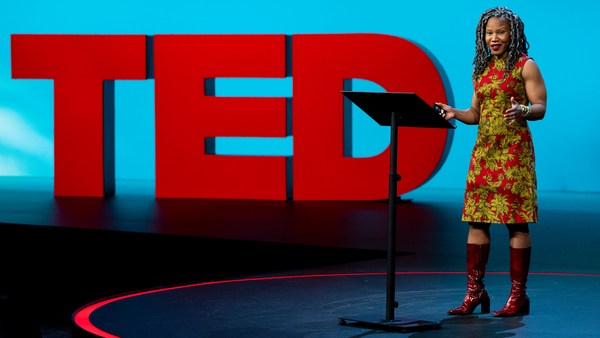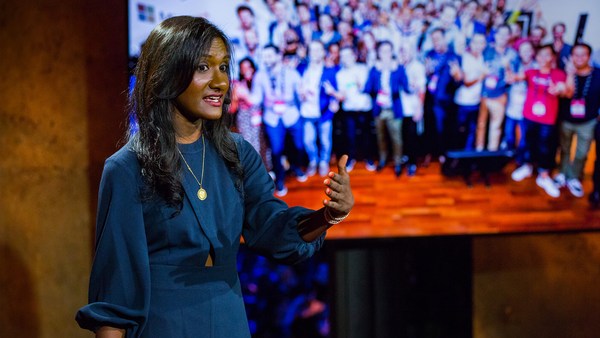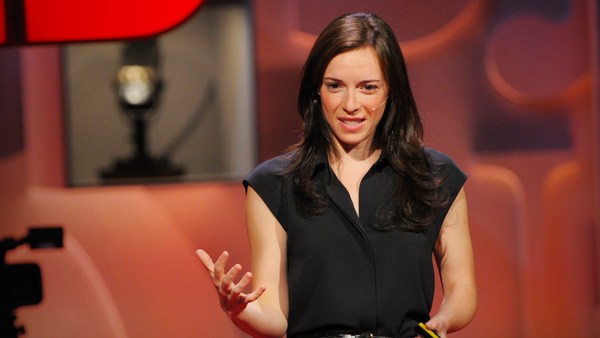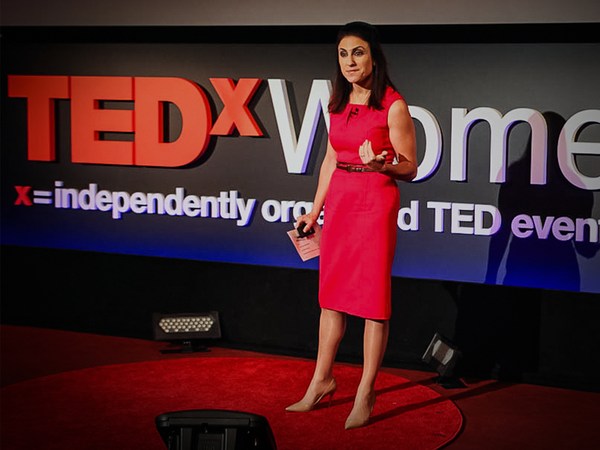We don't choose the circumstances of our birth, but our family, our neighborhood, our financial resources play an outsized role in everything that happens to us: how long we live, whether we're at risk for depression or diabetes, whether we have access to good role models and good schools that put us on a path, perhaps to a selective college, perhaps an alternative path to a great career.
But this random birth lottery is unfair. It creates wide gaps between where some of us start out with great advantages and others start out with persistent barriers, obstacles, roadblocks, not of their own making. Often both personal and systemic. We need to close those gaps. How do we do that?
There's certainly a role for philanthropy, and structural change is also needed. But I also think there's a key role for private-sector-backed startups. That means, though, that we have to reassess how we evaluate talent and how we define what constitutes a good business.
I'm a venture capitalist, but I didn't start out that way. I've been an activist for much of my life. In middle school, you could find me on the picket line with Cesar Chavez's farm workers. As an undergraduate, you could find me working at one of the first rape crisis centers in the US. By the mid 1970s, I cofounded the first group to focus exclusively on sexual harassment in the United States.
(Applause)
In the 1980s, I found myself in corporate America, recruited by the software company Lotus, with a job description to help make it the most progressive employer in the US.
So in the mid '80s, I was working on diversity, inclusion, corporate culture, long before it was a thing, before it grabbed headlines from people who love it or now people who actually hate it. But I wanted to get even closer to building fairness into the core of tech businesses. That's what led me to venture capital.
In 2011, I cofounded Kapor Capital with my husband, Mitch Kapor, the founder of Lotus. OK.
(Laughter)
I know what you're thinking. We were not an office romance. He's a really smart guy, and he would not hit on a senior management team member who had founded the first group on sexual harassment in the US.
(Laughter)
So a decade after I left Lotus, we became a couple.
We started Kapor Capital with a small team, our own funds and a very clear hypothesis. We wanted to see if you could make "venture-scale" financial returns with a portfolio of companies whose core business closed gaps of access, opportunity or outcome for low-income communities and/or communities of color.
(Applause)
So we had to throw out the standard VC playbook and come up with new models.
The first barrier for a founder who cares about gap closing is how to find values-aligned teammates. One of our founders early on, Bhavin, cofounder of Magoosh, a very effective and affordable test prep company, said, "You need to give us a seal of approval so we can find each other." That led to our founders commitment, which we implemented in January of 2016. Since that time, we have not written a check to a founder who doesn't commit to building a diverse team and inclusive culture, and one that matches his consumers or her business model. Very important that it's not a cookie cutter exercise. It's not check-the-box. It's a customized approach by our great entrepreneurs.
The second barrier that our entrepreneurs face, how do they find us? How do they find venture capitalists who are willing to support gap-closing businesses? Standard VC playbook? A warm intro. You've got to know somebody who's a partner at a VC firm. Maybe it was a business-school buddy. Maybe you've got a rich uncle. Not with us. If your business meets our investment criteria, tech startup, gap closing, we want to know about you. You submit through the website. That means we see about 3,000 deals a year. A lot to sift through, but we get gems like Book Nook. None of their team overlapped at all with any of our team. They're a high-impact tutoring company focusing on reading skills for grades K-through-eight. They are now in more than 7,000 schools and educational institutions. They have more than 6,000 tutors, and they recently raised a funding round of 25 million dollars.
(Applause)
The next challenge for us is evaluating talent. Being an entrepreneur is a hard and lonely journey. Standard VC playbook? Credentials, pedigrees, work at a VC-backed company before. Not us. We want to know your distance-traveled story. We want to know where you started in life and how far you got on your own steam.
Let me give you an example. Phaedra Ellis-Lamkins. She was raised by a single mom, hard-working waitress. Phaedra went to her local public school that offered free or reduced lunch for those families who needed that support. But at Phaedra's school, she had to stand in a different line than the kids who walked in the door with lunch money in their pocket. That was understandably a humiliating and scarring experience. It put her on her life's path to improve the quality of life for hard-working, low-income people, and to treat them with respect and dignity. Her company, Promise, helps people who are behind on their water bills or their utility bills. Now, if that's your situation, you have to take a day off of work, which you can't afford, might even jeopardize your job. You stand in line with reams of paperwork to prove that you're actually poor and can't pay that bill.
Enter Promise. What do you need? You need your phone. You need to text in how much you can reasonably afford to pay and what date is the best date for you to make that payment. No fees, no interest. Promise gets paid from those public coffers it helps fill. In their pilots, in places like Louisville, Kentucky and Los Angeles County, 95 percent of people repaid their bills.
(Applause)
What does that mean? Public coffers, cities, counties, states, got much needed revenue they didn't know that they would have. Low-income working families saw their credit scores vastly improve and a path into the mainstream financial system. It is entrepreneurs like Phaedra that we love to back. Promise is now a profitable business with 100-million-dollar pipeline of business.
(Applause)
Phaedra's lived experience and our distance-traveled yardstick combined to help fuel her passion for treating low-income, hard-working people with dignity and respect to build tools that improve the quality of their lives.
Most of our entrepreneurs have similar stories. Our entrepreneurs use their lived experience to design real solutions to real problems. Who better than those with the distance-traveled story, the intimate knowledge of those barriers, who better to design effective solutions?
Our entrepreneurs are often greeted with doubt. Although we often hear it's possible to do well financially and do good at the same time, it's not what they encounter. They get pushback. Take diversity out of your pitch deck. Take impact out of your pitch deck. Just focus on making money.
Well, but here's the proof. A dozen years in, a couple of hundred companies, 60 percent underrepresented founders, Black, Latinx, LGBTQ, women of all backgrounds. Our financial returns are top quartile. We beat 75 percent of the other venture capital firms of our size and our vintage.
(Applause)
Not just those with the diversity lens or an impact lens. We beat the greed-only set who --
(Applause)
Who just wanted to make money.
So there's another barrier that we wanted to challenge, another standard practice we thought we might be able to improve, and that's succession planning. Most venture capital firms don't do a very good job of it. And there's all kinds of tension with the new folks and the old folks. We wanted to do that differently, too.
Enter Ulili Onovakpuri and Brian Dixon. They are the new managing partners, co-managing partners of Kapor Capital. Ulili grew up in a low-income family in the Bay area, San Francisco Bay area, worked really hard, got into UC Berkeley, designed her own major, and then came to work with us. Early on, she said, "Let's start a summer associates program so that other people, who don't know what venture capital is, have access." Enter Brian Dixon. Our first summer associate working on his MBA, he had a computer science undergrad degree. As a teenager, he started a custom sneaker business and he snared LeBron James as a customer.
So Brian and Ulili went out and raised 127 million dollars, making it one of the largest Black-led VC funds in the country.
(Applause)
We know that they're going to keep the core rigor of the firm. We know they're going to take the firm to all kinds of new places. Ulili likes to say I open doors and she puts in the door stop. She makes sure not only that she comes through, but that she's not the last one. She makes sure lots of others come after her. I can't wait to meet all of the fabulous gap-closing entrepreneurs that are going to build great businesses under Brian and Ulili's leadership.
Thank you.
(Applause)
